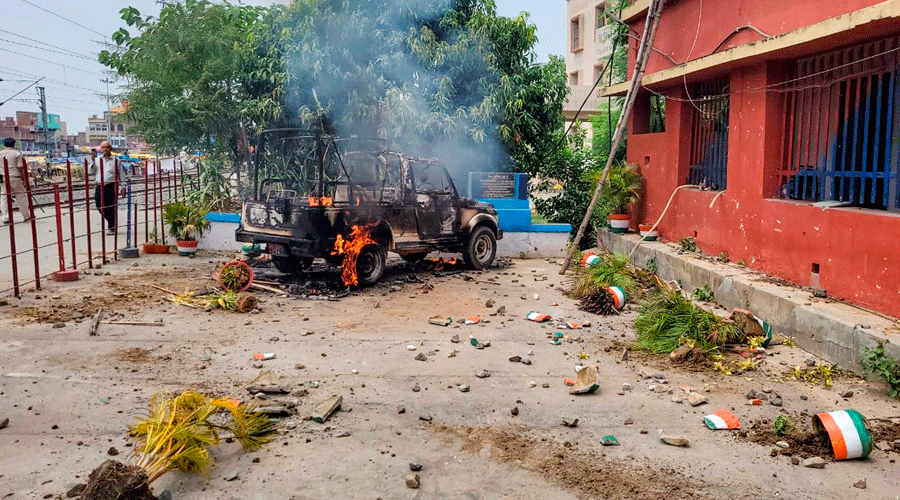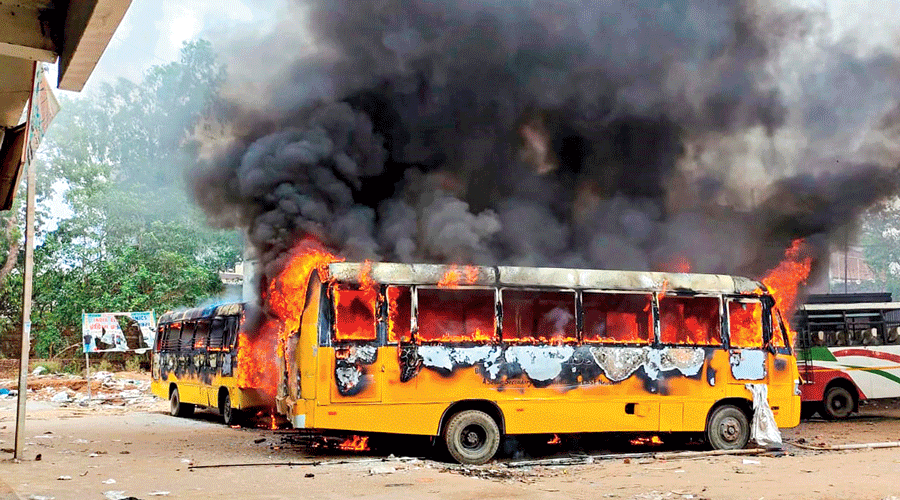The Agnipath scheme of armed forces recruitment, offering an abridged tenure of four years and retirement without pension, merely lit the fire.
What had prepared the tinderbox, conversations with the agitators suggest, were a range of pent-up grievances and fears.
Joblessness and the sense of insecurity, for one (“We are unemployed now, we will be unemployed again after four years if selected under Agnipath; we won’t be able to take care of our families”).
The economic distress that has devastated the working class, for another (“My father’s income has fallen in recent years; after four years, will he have to take care of me again?”)
Frustration had also been building at the government’s perceived authoritarianism (“Why didn’t they consult the youth before announcing the scheme”).
A wiry teen seemed to be enjoying burning tyres and blocking traffic in the Patna University area along the Ashok Rajpath, the royal road existing since the time of Emperor Asoka, the apostle of non-violence.
As he spoke to The Telegraph, his young shoulders seemed stooped with the weight of anxiety and hopelessness.
“I shall turn 19 next month. My father runs a small grocery and has taken care of the family till now,” said the boy, eldest of three siblings, whose name this newspaper is withholding so he doesn’t face official repercussions.
“Things haven’t been going well for the last few years. Customers go to the malls or shop online just for a little bit of discount. My father cannot afford to keep educating us forever. I decided to join the army so that my younger brother and sister could study,” the teen, who has passed his Class XII boards, said.
The boy had been running a few miles every morning, doing physical exercises and studying to crack the army written test for over a year now. Then came Agnipath.
“It was like a thunderbolt strike on me and people like us. Just four years of service and then back to square one? What would I do after that? Do we live just for ourselves; don’t we have families to look after? The government is so insensitive,” he said.
Another protest in the middle of Patna had a few hundred youths chanting “Bharti do ya arthi do (Give us a job or death)” and anti-government slogans.
Asked why they were protesting despite the government offering a one-time relaxation of the upper age limit for recruitment, from 21 years to 23, they couldn’t hide their scorn.
“The age relaxation is to compensate for the two-year recruitment freeze during the pandemic. We had demanded it earlier too. It’s in no way connected to Agnipath and does not change the basic situation,” a protester said.
“Do you think a four-year job is just? What will we do later? Use our savings to study again?”
A youth standing beside him asked why the government had not sought public opinion before announcing the Agnipath scheme.
“We don’t vote them to power to work against the people. The Prime Minister or the defence minister could have sought suggestions from the public,” he said.
“They could have announced their intention beforehand or said they would implement such a scheme after five years. They could have started off by recruiting 10 per cent of the personnel under the scheme and increased the proportion gradually.”
Another army job aspirant said: “The Centre is not bothered about unemployment. It’s only focused on cutting the expenditure on the armed forces. We are anyway unemployed now; we shall be unemployed again after four years if selected under Agnipath. We will not be able to take care of our families.”
Several protesters asked why the four-year option was not being applied to the paramilitary forces and the various civil services too.
Some suggested the government should have worked out a scheme so that the soldiers demobilised after four years are absorbed in the paramilitary or state police forces.
On Saturday, the defence ministry and the Union home ministry announced separate 10 per cent job reservations for Agnipath recruits demobilised after four years.
“We spend two to three years preparing for jobs in the armed forces; so why should we join the army for just four years? What will we do after that? Become security guards for IT companies? The government should reinstate the previous recruitment scheme,” said a protester.
The youth had cleared his physical and medical tests for army recruitment and waited through the pandemic for the written exam to be held.
“We have proof of having appeared in the medical and physical tests. We were continually told that the final exam was being postponed because of the pandemic,” he said.
“Suddenly, the government has cancelled all previous processes and brought in Agnipath. We can’t be taken for granted like this.”
Bihar had erupted the day after defence minister Rajnath Singh announced the Agnipath scheme in Delhi on Tuesday.
Under the scheme, youths aged 17.5 to 21 (for this year, 23) who have cleared Class X are eligible for four years’ service in the armed forces in non-officer ranks. Only one-fourth of them will be retained for another 15 years under regular terms.
The government has introduced the scheme to ease the armed forces’ salary and pension bills.












